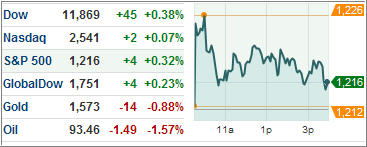Markets were in a state of flux today as the S&P 500 bumped up only 0.32%. Nevertheless, the Euro remained at $1.30/Euro while commodities didn’t fluctuate tremendously. Pretty much, the outlook hasn’t brightened any more today.
However, on the Asian front, markets took somewhat of a dive as the Shanghai Composite and Nikkei dropped 2.14% and 1.67%, respectively.
IMF chief Christine Lagarde highlighted the severity of the Eurozone crisis by advocating a coordinated effort to stem the contagion. She went so far as to imply that we can see a worldwide economic collapse akin to the Great Depression. The risk certainly hasn’t dissipated.
In addition, ECB president Mario Draghi stressed the need for European banks to tap into the ECB to boost liquidity, and in effect, lending, even though liquidity is not the problem; solvency is. Nevertheless, a credit crunch could seriously hamper the real economy if banks are unwilling (or unable) to lend, further exacerbating the debt crisis.
As far as development related to the EU treaty are concerned, further frictions have surfaced. Some countries are favoring a more restricted treaty with regards to the budget deficit guidelines. In essence, an initially promising treaty looks like it’s getting watered down with France and Germany at odds once more.
And the whole debacle with UK refusing to agree to the new treaty has gotten a bit personal. French central bank governor Christian Noyer suggested that the UK should get downgraded amidst talks that France is on the downgrade chopping block. The political bickering just never seems to stop.
Data were also released today that painted a mixed economic picture for the U.S. Unemployment claims fell to 366,000, although this may be due to some discouraged workers leaving the labor force. Meanwhile, there was some improvement in manufacturing in the Northeast. However, industrial production and capacity utilization decreased on a national scale.
In China, talk of a burgeoning property bubble is reaching fever pitch while the country’s manufacturing has shown weakness as of late. Furthermore, foreign direct investment dipped 10% in November, an additional sign that China is encountering economic frailty that can be compounded by worsening conditions in Europe.
At this point in time, the economic and financial headwinds aren’t going away. Continued problems across Europe, a lack of improvement in the U.S., and a negative outlook for China are accumulating into a cannonball that can crush the world economy over the next couple years at least. Thus, I have reduced equities, and I’m sticking to an allocation of bond ETFs to limit my downside exposure.
Contact Ulli
